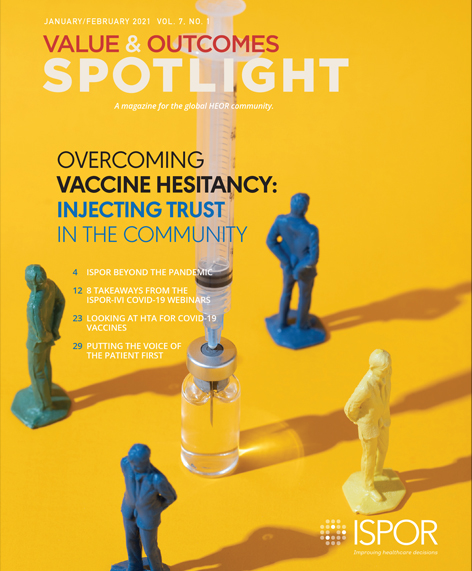Virtual ISPOR 2021 | May 17-20 HEOR: Evolving for Tomorrow’s Challenges
HEOR experts will discuss topical issues during plenary sessions, spotlight sessions, breakouts with issue panels and workshops, symposia and more
• Virtual poster presentations
• Networking opportunities include live group and private discussions,and planned social hours
• Exhibitor gallery
Watch for on demand-only content—to be introduced in advance of the conference!
Learn more at www.ispor.org/ISPOR2021
Join the conversation on Twitter #ISPORAnnual
Virtual ISPOR Europe 2021 | 1-3 December
Save the Date
ISPOR Europe 2021, the leading European conference for HEOR, is planned for
1-3 December as a virtual conference. Virtual ISPOR Europe 2021 will offer on demand-only content that will be released leading up to the conference, 3-days of live programming, ePoster presentations, networking opportunities, a virtual exhibitor gallery, and access to post-conference recordings for a full month after the event. If it is safe to do so (considering the status of the pandemic), in-person sessions will be added to the conference. Announcements regarding possible in-person sessions will be made later this year.
Virtual ISPOR Education
Virtual ISPOR Short Courses
Gain essential methodologies in HEOR with the renowned ISPOR Short Course Program! Led by expert faculty in the field of HEOR, these 4-hour, fundamental- and hot topic-courses are conveniently offered virtually. Each session includes engaging coursework, opportunities to interact with the expert leaders, and an electronic course book. Register today! LEARN. APPLY. ADVANCE.
Short Courses are not recorded, therefore attendance of the live-broadcast is mandatory.
Introduction to Modeling Methods
10-11 February | 4-Hours Total | 2-Day Short Course
In this course, faculty will present analytic approaches to different decision model types, including deterministic cohort simulation and Monte Carlo microsimulation, and will provide some technical instructions for modelers. Participants learn about the concepts of variability, uncertainty, probabilistic sensitivity analysis, and cost-effectiveness acceptability curves.
The course will be taught by Uwe Siebert, MPH, MSc, ScD, MD, UMIT, Innsbruck, Austria.
Network Meta-Analysis in Relative Effectiveness Research
24-25 February | 4-Hours Total | 2-Day Short Course
This course gives a brief overview of different decision-analytic model types and provides an introduction to Markov modeling techniques. Based in part on the ISPOR Task Force Reports on Indirect Treatment Comparisons, the fundamentals and concepts of network meta-analysis will be presented. The evaluation of networks presents special challenges and caveats, which will also be highlighted in this course. The material is motivated by instructive and concrete examples. The ISPOR-AMCP-NPC questionnaire for assessing the credibility of a network meta-analysis will also be introduced.
The course will be taught by Jeroen P. Jansen, PhD, Precision Xtract, Oakland, CA, USA; Sarah Goring, MSc, Precision Xtract, Vancouver, Canada.
Introduction to Health Technology Assessment (HTA)
3-4 March | 4-Hours Total | 2-Day Short Course
The course provides an overview of basic HTA principles including benefit assessment (biostatistics, clinical epidemiology, patient-relevant outcomes, risk-benefit assessment), economic evaluation (costing, cost-effectiveness analysis, pharmacoeconomic modeling, budget impact analysis, resource allocation), and ELSI (ethical, legal, and social implications). Using real-world examples covering both drugs and devices, the course will review the practical steps involved in developing and using HTA reports in different countries and healthcare systems.
The course will be taught by Uwe Siebert, MPH, MSc, ScD, MD, UMIT, Innsbruck, Austria; Petra Schnell-Inderst, MPH, PhD, UMIT, Innsbruck, Austria.

